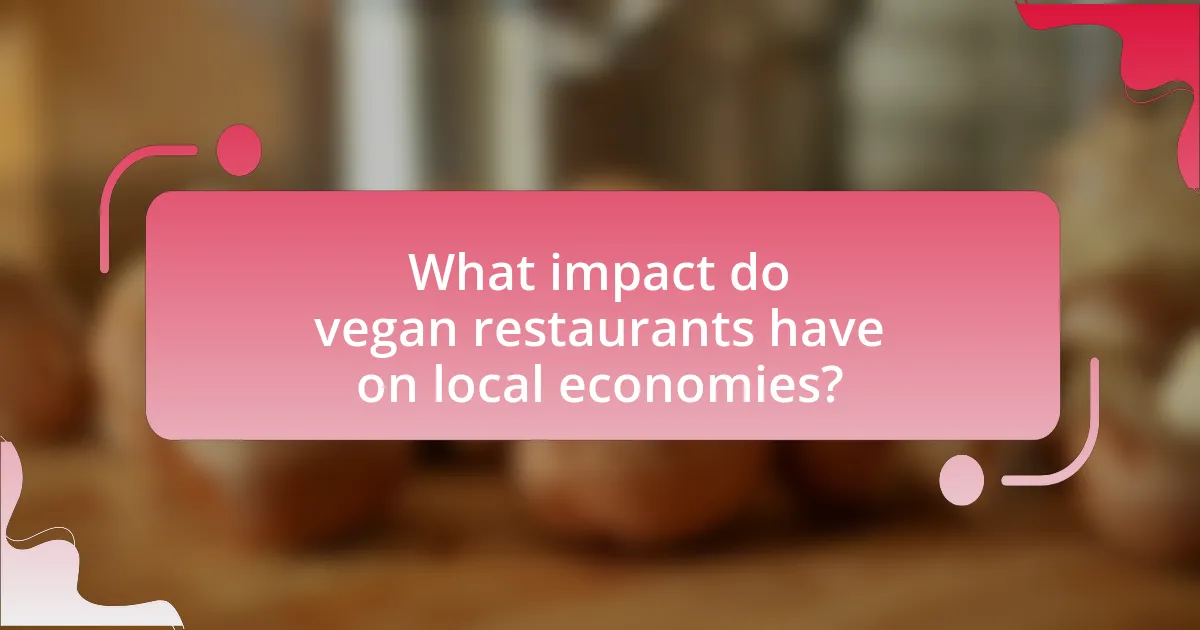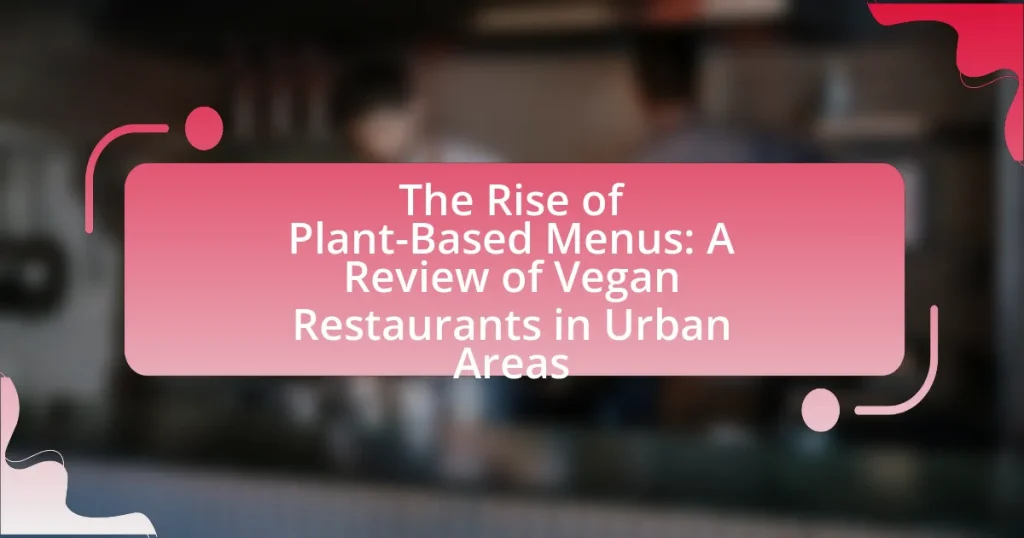The article examines the rise of plant-based menus in urban areas, highlighting their significance in promoting sustainability, improving public health, and meeting the increasing demand for ethical food choices. It discusses the evolution of plant-based dining, driven by health consciousness, environmental concerns, and cultural shifts, as well as the growing popularity of vegan restaurants. Key factors influencing this trend include demographic changes, consumer preferences, and the challenges faced by vegan establishments in competitive urban markets. The article also explores the economic impact of vegan restaurants on local economies, their role in promoting health and wellness, and best practices for aspiring restaurateurs in the vegan dining sector.

What is the significance of plant-based menus in urban areas?
Plant-based menus in urban areas are significant because they promote sustainability, improve public health, and cater to the growing demand for ethical food choices. Urban centers face challenges such as high carbon footprints and food deserts, and plant-based diets can reduce greenhouse gas emissions by up to 70% compared to meat-based diets, according to a study published in the journal “Nature.” Additionally, plant-based menus can help combat obesity and related diseases, as they are typically lower in calories and higher in nutrients. The increasing popularity of veganism, with a reported 600% rise in the number of vegans in the U.S. from 2014 to 2017, indicates a shift in consumer preferences that urban restaurants are responding to by offering diverse plant-based options.
How have plant-based menus evolved in recent years?
Plant-based menus have significantly evolved in recent years, reflecting a growing consumer demand for healthier and more sustainable food options. This evolution is evidenced by a 300% increase in plant-based food sales from 2013 to 2020, according to a report by the Plant Based Foods Association. Additionally, many restaurants have expanded their offerings to include innovative plant-based dishes that cater to diverse culinary preferences, moving beyond traditional vegetarian options to include gourmet and globally inspired meals. This shift is further supported by the rise of plant-based meat alternatives, such as those produced by Beyond Meat and Impossible Foods, which have gained mainstream acceptance and are now featured in numerous fast-food chains and casual dining establishments.
What factors have contributed to the rise of plant-based diets?
The rise of plant-based diets has been significantly influenced by health consciousness, environmental concerns, and ethical considerations regarding animal welfare. Health studies indicate that plant-based diets can reduce the risk of chronic diseases such as heart disease and diabetes, leading to increased consumer interest. Additionally, research from the Food and Agriculture Organization highlights that livestock farming contributes to greenhouse gas emissions, prompting individuals to adopt plant-based diets for environmental sustainability. Ethical concerns about animal treatment in the food industry further drive the shift towards plant-based eating, as consumers seek alternatives that align with their values.
How do urban lifestyles influence dietary choices?
Urban lifestyles significantly influence dietary choices by promoting convenience, diversity, and health consciousness. In urban settings, individuals often prioritize quick meal options due to busy schedules, leading to an increased demand for fast-casual dining and takeout, which frequently includes plant-based options. Additionally, urban areas typically offer a wider variety of food choices, including international cuisines that often feature plant-based dishes, thus encouraging exploration of vegan and vegetarian diets. Research indicates that urban residents are more likely to adopt healthier eating habits, with a 2019 study published in the Journal of Urban Health showing that city dwellers are 25% more likely to consume fruits and vegetables compared to those in rural areas. This shift towards health-oriented diets is further supported by the rise of vegan restaurants in cities, reflecting a growing trend towards plant-based eating among urban populations.
Why are vegan restaurants gaining popularity in cities?
Vegan restaurants are gaining popularity in cities due to increasing consumer awareness of health, environmental sustainability, and ethical concerns regarding animal welfare. Research indicates that 39% of Americans are actively trying to incorporate more plant-based foods into their diets, reflecting a significant shift in dietary preferences. Additionally, the rise of social media has amplified the visibility of vegan options, making them more appealing to a broader audience. This trend is further supported by the growing availability of plant-based ingredients and innovations in food technology, which enhance the quality and variety of vegan offerings.
What demographic trends support the growth of vegan dining?
The growth of vegan dining is supported by several demographic trends, including an increase in health-conscious consumers, a rise in environmental awareness, and a shift in dietary preferences among younger generations. Health-conscious consumers are increasingly seeking plant-based options due to their perceived health benefits, with a 2021 survey indicating that 60% of Americans are trying to incorporate more plant-based foods into their diets. Additionally, younger generations, particularly Millennials and Gen Z, are driving the demand for vegan dining, as they prioritize sustainability and ethical consumption; research shows that 70% of Millennials are willing to pay more for sustainable products. Furthermore, the growing awareness of climate change has led to a significant portion of the population adopting vegan diets to reduce their carbon footprint, with studies revealing that plant-based diets can lower greenhouse gas emissions by up to 50%. These trends collectively indicate a robust and expanding market for vegan dining options.
How do cultural shifts impact the acceptance of vegan cuisine?
Cultural shifts significantly enhance the acceptance of vegan cuisine by altering societal norms and values regarding food consumption. As awareness of health, environmental sustainability, and animal welfare increases, more individuals embrace plant-based diets. For instance, a 2021 survey by the Plant Based Foods Association found that 57% of Americans are incorporating more plant-based foods into their diets, reflecting a growing trend towards veganism influenced by cultural movements advocating for ethical eating. Additionally, social media platforms amplify vegan cuisine visibility, showcasing diverse recipes and lifestyles that resonate with younger generations, further driving acceptance.
What challenges do vegan restaurants face in urban environments?
Vegan restaurants in urban environments face several challenges, including competition from traditional dining options, limited access to high-quality plant-based ingredients, and consumer misconceptions about vegan cuisine. The competitive landscape is intense, as urban areas often have a diverse range of dining establishments, making it difficult for vegan restaurants to attract a steady customer base. Additionally, sourcing fresh and high-quality plant-based ingredients can be problematic due to supply chain limitations and higher costs compared to conventional ingredients. Consumer misconceptions, such as the belief that vegan food is bland or unsatisfying, can further hinder the growth of these establishments, as they may struggle to change perceptions and attract a wider audience.
How do competition and market saturation affect vegan establishments?
Competition and market saturation significantly impact vegan establishments by influencing their pricing strategies, customer base, and overall viability. As more vegan restaurants enter the market, existing establishments may face pressure to lower prices to attract customers, which can reduce profit margins. A study by the Plant Based Foods Association reported a 27% increase in plant-based food sales in 2020, indicating growing consumer interest, but also highlighting the need for differentiation among establishments to maintain market share. Additionally, market saturation can lead to a fragmented customer base, where consumers have numerous options, making it essential for vegan establishments to innovate and offer unique dining experiences to stand out.
What are the common misconceptions about vegan dining?
Common misconceptions about vegan dining include the belief that it is bland, lacks variety, and is nutritionally inadequate. Many people assume that vegan meals consist solely of salads and vegetables, ignoring the diverse range of flavors and cuisines available, such as vegan versions of traditional dishes and innovative plant-based creations. Additionally, some individuals think that a vegan diet cannot provide sufficient protein or essential nutrients, but studies show that a well-planned vegan diet can meet all nutritional needs, as evidenced by the Academy of Nutrition and Dietetics, which states that appropriately planned vegan diets are healthful and nutritionally adequate.

How do vegan restaurants differentiate themselves in urban markets?
Vegan restaurants differentiate themselves in urban markets through unique culinary offerings, innovative dining experiences, and targeted marketing strategies. These establishments often create distinctive menus that highlight local and seasonal ingredients, catering to health-conscious consumers and those seeking sustainable dining options. For instance, many vegan restaurants incorporate global cuisines, fusion dishes, and artisanal preparations to attract diverse clientele. Additionally, they may enhance the dining experience with eco-friendly practices, such as zero-waste initiatives and plant-based cocktails, which resonate with environmentally aware patrons. According to a report by the Plant Based Foods Association, the plant-based food market has grown by 27% in the past year, indicating a rising demand for vegan options in urban settings. This growth underscores the importance of differentiation in attracting a loyal customer base.
What unique offerings do successful vegan restaurants provide?
Successful vegan restaurants provide innovative plant-based dishes that often replicate traditional meat and dairy flavors, catering to both vegans and non-vegans. These establishments frequently utilize unique ingredients such as jackfruit, tempeh, and aquafaba to create diverse menu options that appeal to a wide audience. For example, many successful vegan restaurants offer gourmet versions of classic comfort foods, like vegan burgers made from black beans or lentils, and dairy-free desserts using coconut milk or cashew cream. This approach not only attracts a larger customer base but also promotes inclusivity in dining experiences, as evidenced by the growing trend of plant-based eating among non-vegans, with a report from the Plant Based Foods Association indicating a 27% increase in plant-based food sales in the past year.
How do menu innovations attract diverse clientele?
Menu innovations attract diverse clientele by offering a variety of options that cater to different dietary preferences and cultural tastes. For instance, the introduction of plant-based dishes in vegan restaurants appeals not only to vegans but also to flexitarians and health-conscious consumers, expanding the customer base. Research indicates that 39% of consumers are actively trying to incorporate more plant-based foods into their diets, demonstrating a growing interest in diverse menu offerings. By incorporating global flavors and ingredients, restaurants can further engage customers from various backgrounds, enhancing their appeal and driving increased patronage.
What role does sustainability play in restaurant branding?
Sustainability plays a crucial role in restaurant branding by enhancing a restaurant’s reputation and attracting environmentally conscious consumers. Restaurants that prioritize sustainable practices, such as sourcing local ingredients and minimizing waste, differentiate themselves in a competitive market. For instance, a 2021 survey by the National Restaurant Association found that 60% of consumers are more likely to choose a restaurant that demonstrates a commitment to sustainability. This consumer preference underscores the importance of sustainability in shaping brand identity and loyalty in the restaurant industry.
How do vegan restaurants cater to various dietary preferences?
Vegan restaurants cater to various dietary preferences by offering diverse menu options that accommodate gluten-free, nut-free, soy-free, and raw diets. These establishments often include clearly labeled dishes to help customers identify suitable choices, ensuring inclusivity for individuals with specific dietary restrictions. For example, many vegan restaurants utilize alternative grains like quinoa or rice to provide gluten-free options, while also incorporating a variety of vegetables and legumes to meet different nutritional needs. This approach not only broadens their customer base but also aligns with the growing demand for personalized dining experiences in urban areas, where dietary diversity is increasingly prevalent.
What are the most popular plant-based dishes among consumers?
The most popular plant-based dishes among consumers include vegan burgers, plant-based tacos, and lentil soups. Vegan burgers, often made from ingredients like black beans or chickpeas, have gained significant traction due to their meat-like texture and flavor, appealing to both vegans and non-vegans alike. Plant-based tacos, filled with ingredients such as jackfruit or tempeh, offer a flavorful alternative to traditional meat tacos. Lentil soups are favored for their nutritional value and heartiness, making them a staple in many plant-based diets. These dishes reflect the growing demand for plant-based options in urban areas, as evidenced by the increasing number of vegan restaurants and menu offerings.
How do restaurants accommodate gluten-free or allergen-free options?
Restaurants accommodate gluten-free or allergen-free options by offering specialized menus, training staff on cross-contamination prevention, and sourcing ingredients that meet dietary restrictions. Many establishments provide clear labeling on their menus to indicate which dishes are gluten-free or allergen-free, ensuring transparency for customers. Additionally, some restaurants may have dedicated preparation areas or equipment to minimize the risk of cross-contact with allergens. This approach is supported by the increasing demand for dietary accommodations, as evidenced by a 2021 survey indicating that 30% of consumers actively seek gluten-free options when dining out.

What impact do vegan restaurants have on local economies?
Vegan restaurants positively impact local economies by creating jobs, increasing local spending, and attracting tourism. These establishments often employ local residents, contributing to job growth; for instance, a study by the Plant-Based Foods Association found that the plant-based food sector generated over 50,000 jobs in the U.S. in 2020 alone. Additionally, vegan restaurants tend to source ingredients from local farmers and suppliers, which stimulates the local agricultural economy. Furthermore, the unique offerings of vegan restaurants can draw visitors from outside the area, enhancing local tourism and increasing revenue for nearby businesses.
How do vegan establishments contribute to job creation?
Vegan establishments contribute to job creation by generating employment opportunities in various sectors, including food service, agriculture, and retail. The rise of vegan restaurants has led to an increase in demand for chefs, servers, and kitchen staff, as well as roles in supply chain management for plant-based ingredients. According to a report by the Plant Based Foods Association, the plant-based food market grew by 27% in 2020, indicating a significant expansion that necessitates hiring more employees to meet consumer demand. This growth not only creates direct jobs within the establishments but also stimulates ancillary job creation in related industries, such as transportation and marketing, further enhancing overall employment in urban areas.
What economic benefits arise from supporting local suppliers?
Supporting local suppliers generates significant economic benefits, including job creation, increased local spending, and enhanced community resilience. When consumers choose local suppliers, they contribute to the local economy by keeping money within the community, which can lead to a multiplier effect; for instance, studies show that local businesses recirculate a greater share of every dollar as they create locally owned supply chains. Additionally, supporting local suppliers fosters job creation, as local businesses tend to employ local residents, thereby reducing unemployment rates. According to the American Independent Business Alliance, local businesses create an average of 2.5 jobs for every 1 job at a chain retailer. Furthermore, local suppliers often have a smaller environmental footprint, which can lead to long-term sustainability benefits for the community.
What role do vegan restaurants play in promoting health and wellness?
Vegan restaurants play a significant role in promoting health and wellness by providing plant-based meal options that are often lower in saturated fats and higher in essential nutrients. These establishments contribute to healthier eating habits by offering diverse menus rich in fruits, vegetables, whole grains, and legumes, which are associated with reduced risks of chronic diseases such as heart disease, diabetes, and obesity. Research indicates that diets high in plant-based foods can lead to improved overall health outcomes, as evidenced by a study published in the Journal of the American Heart Association, which found that plant-based diets are linked to lower blood pressure and cholesterol levels. By making nutritious food accessible and appealing, vegan restaurants encourage individuals to adopt healthier lifestyles.
How do plant-based menus influence public health trends?
Plant-based menus positively influence public health trends by promoting healthier dietary choices and reducing the prevalence of chronic diseases. Research indicates that diets rich in plant-based foods are associated with lower risks of heart disease, obesity, and type 2 diabetes. For instance, a study published in the Journal of the American Heart Association found that individuals adhering to plant-based diets had a 32% lower risk of developing heart disease compared to those consuming meat-heavy diets. Additionally, the increased availability of plant-based options in urban areas encourages consumers to adopt healthier eating habits, contributing to overall public health improvements.
What educational initiatives do vegan restaurants undertake?
Vegan restaurants undertake various educational initiatives to promote plant-based diets and sustainability. These initiatives often include hosting workshops and cooking classes that teach participants how to prepare vegan meals, thereby increasing awareness of plant-based nutrition. Additionally, many vegan restaurants provide informational materials, such as brochures and online resources, that highlight the health benefits of a vegan lifestyle and the environmental impact of animal agriculture. Research indicates that educational outreach can significantly influence dietary choices, as seen in studies showing that individuals exposed to plant-based cooking demonstrations are more likely to adopt vegan eating habits.
What are some best practices for starting a vegan restaurant in an urban area?
To successfully start a vegan restaurant in an urban area, it is essential to conduct thorough market research to understand local demographics and preferences. This research should identify the target audience, including their dietary habits and spending patterns, which can inform menu design and pricing strategies. Additionally, sourcing high-quality, local ingredients can enhance the restaurant’s appeal and support sustainability, as studies show that consumers increasingly prefer locally sourced food.
Establishing a strong brand identity that resonates with the values of health, sustainability, and ethical eating is crucial. Engaging with the community through events, partnerships, and social media can build a loyal customer base. Furthermore, offering a diverse menu that caters to various dietary needs, such as gluten-free or allergen-friendly options, can attract a broader clientele.
Finally, ensuring excellent customer service and a welcoming atmosphere can lead to positive reviews and repeat business, which are vital for long-term success in a competitive urban market.
How can aspiring restaurateurs effectively market their vegan offerings?
Aspiring restaurateurs can effectively market their vegan offerings by leveraging social media platforms to showcase visually appealing dishes and engage with the community. Research indicates that 70% of consumers are influenced by social media when making dining decisions, highlighting its importance in reaching potential customers. Additionally, collaborating with local influencers who advocate for plant-based diets can enhance visibility and credibility. Hosting events, such as vegan cooking classes or tastings, can also attract attention and create a loyal customer base. Furthermore, emphasizing the health benefits and sustainability of vegan options in marketing materials can resonate with environmentally conscious consumers, as studies show that 60% of diners are more likely to choose restaurants that promote sustainable practices.
What strategies can be employed to build a loyal customer base?
To build a loyal customer base, vegan restaurants can implement strategies such as offering exceptional customer service, creating a strong community presence, and providing loyalty programs. Exceptional customer service fosters positive experiences, encouraging repeat visits; studies show that 70% of customers are willing to pay more for better service. A strong community presence, through local events and partnerships, enhances brand visibility and trust, as 78% of consumers prefer to support local businesses. Loyalty programs incentivize repeat purchases, with research indicating that customers enrolled in loyalty programs spend 12-18% more than non-members. These strategies collectively contribute to customer retention and loyalty in the competitive vegan restaurant market.












